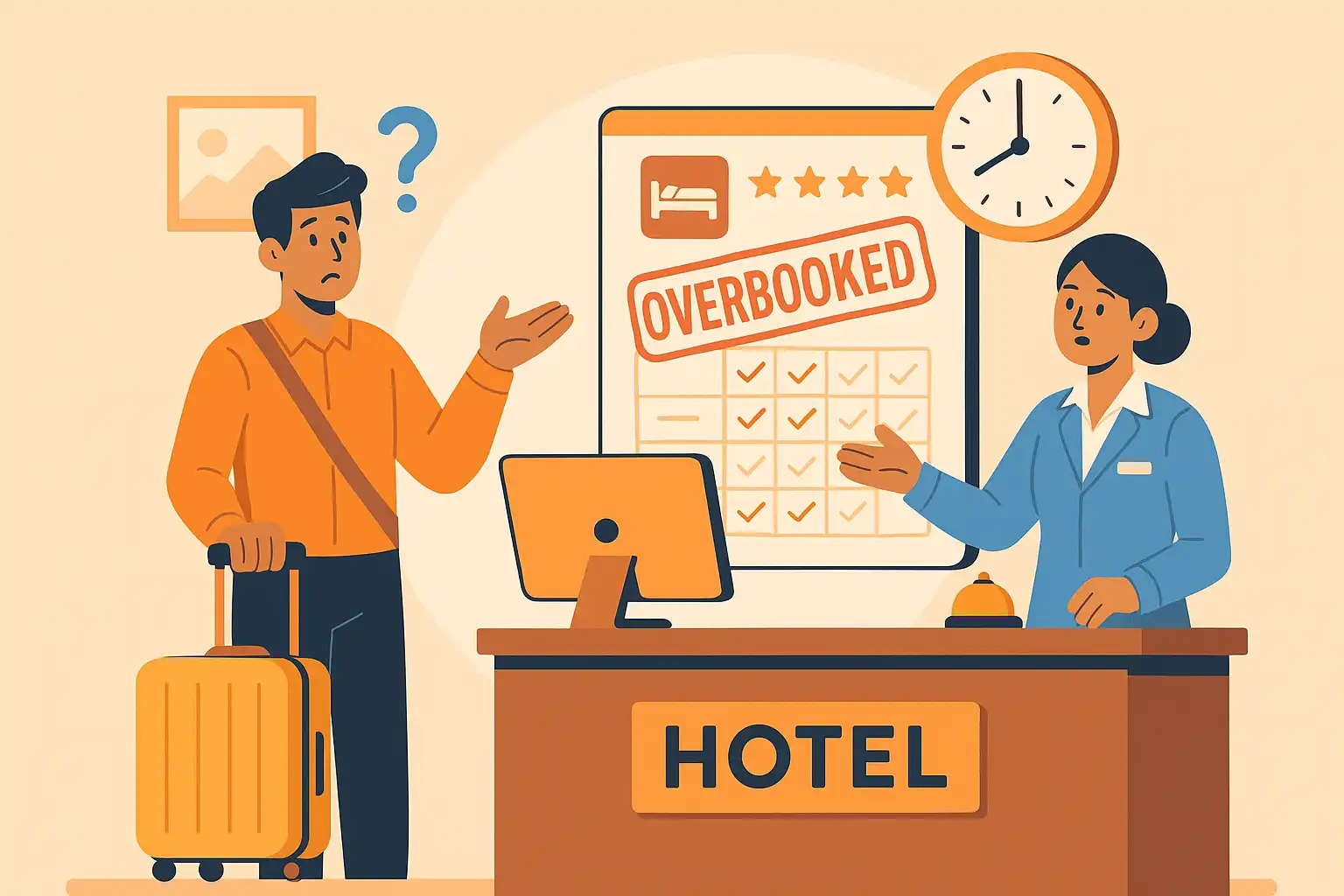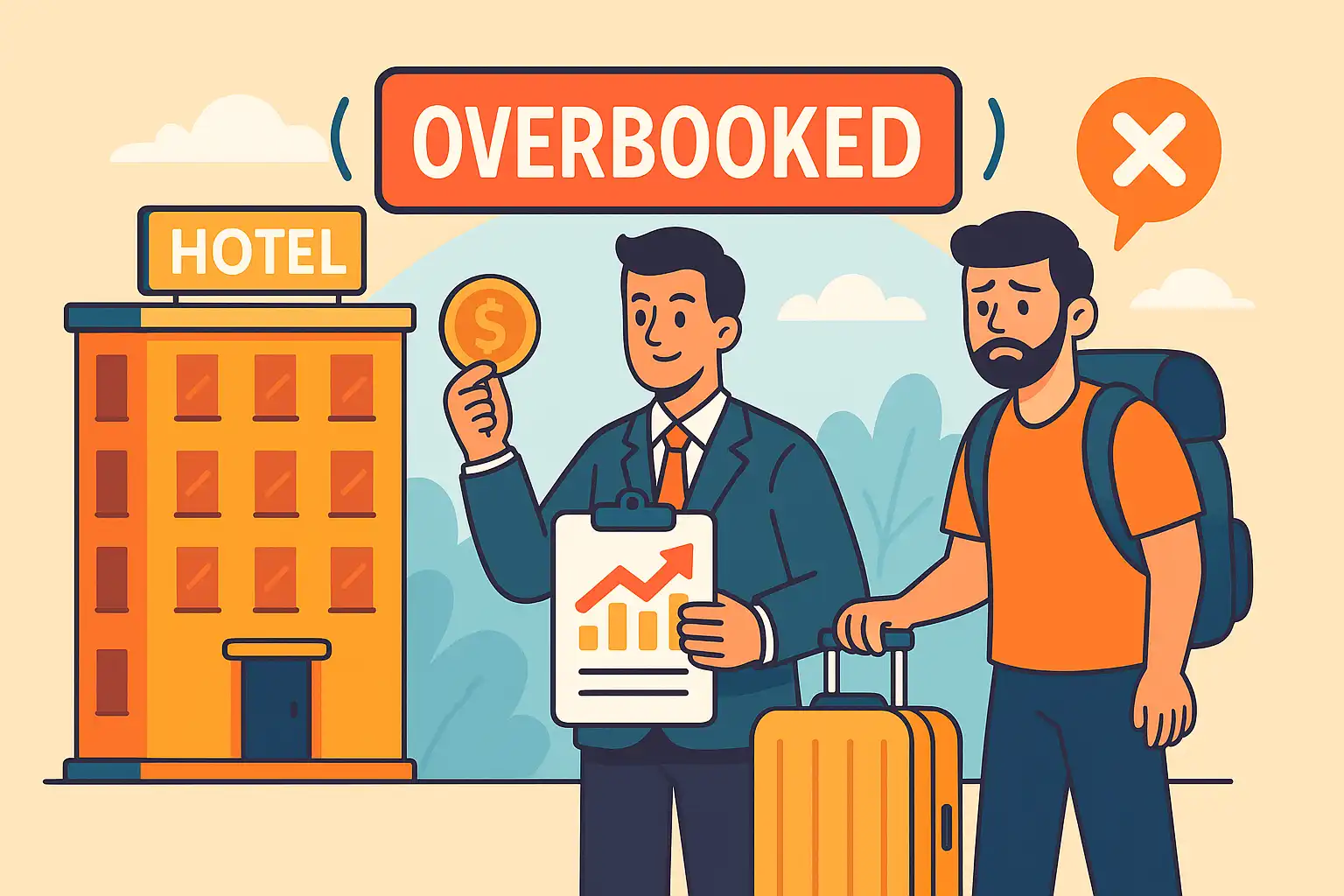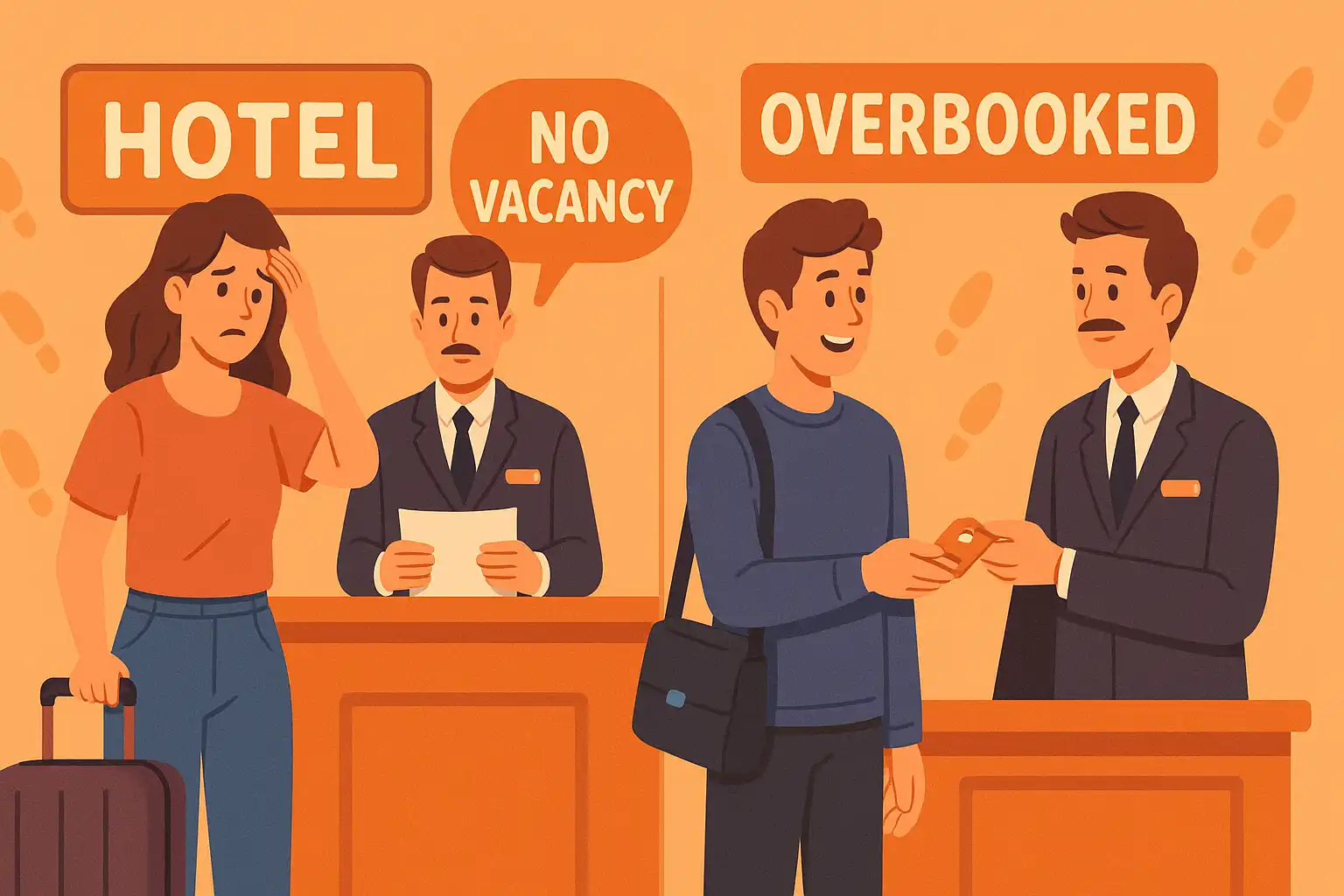Hotel Overbooking: Revenue Optimization and Guest Management
Oct 17, 2025
 Mika Takahashi
Mika TakahashiPopular Categories
Hotel Technology & InnovationHotel Operations OptimizationDigital MarketingIndustry TrendsRevenue ManagementHospitality Industry
Popular Categories
Trending Post

Hotel Walk Letter Template: Professional Guest Communication

Online Travel Agents: What They Are and How They Work

Hotel Security Systems: Modern Protection Solutions

Hotel Advertising: Complete Guide to Boost Bookings and Revenue

25 Hotel Marketing Strategy Ideas for 2025: Complete Guide

AI Reservation Agent: Revolutionizing Hotel Booking and Guest Experience

PMS Communication: Streamlining Property Management Through Effective Guest Messaging
Table of contents
In today’s competitive hospitality industry, effective revenue management can make the difference between profit and loss. Hotel overbooking stands as one of the most powerful yet controversial strategies that successful properties use to maximize revenue while managing the inherent risks of cancellations and no-shows.
This comprehensive guide explores every aspect of hotel overbooking, from strategic implementation to guest management, providing hospitality professionals with the knowledge needed to optimize occupancy rates while maintaining guest satisfaction.
What is Hotel Overbooking?
Hotel overbooking is the strategic practice of selling more hotel rooms than physically available to compensate for expected no-shows and last-minute cancellations. Unlike accidental double bookings, which result from system errors, overbooking represents an intentional revenue management strategy used by approximately 90% of major hotel chains worldwide.
The fundamental concept involves accepting reservations beyond 100% capacity based on historical data that predicts a certain percentage of confirmed guests will not arrive. For example, if a 100-room hotel historically experiences 10% no-shows on a given night, the property might accept up to 110 reservations to achieve optimal occupancy.
This strategic approach differs significantly from accidental double bookings in several key ways:
- Intentional vs. Accidental: Overbooking is a calculated decision based on data analysis, while double bookings result from system failures or human error
- Data-Driven: Successful overbooking relies on historical booking patterns, seasonal trends, and real-time monitoring
- Risk Management: Properties have established procedures for managing situations when more guests arrive than expected
Hotel overbooking directly impacts two critical revenue metrics: occupancy rates and revenue per available room (RevPAR). By strategically managing room inventory beyond 100% capacity, hotels can achieve higher occupancy rates during peak demand periods while maximizing revenue from every available room.

Why Hotels Use Overbooking Strategies
The primary driver behind hotel overbooking strategies is revenue protection. During peak seasons and high-demand periods, up to 40% of bookings may result in cancellations or no-shows, leaving hotels with unsold inventory that represents immediate financial loss.
Industry statistics reveal the scope of this challenge:
- Average no-show rates range from 5-15% depending on location and season
- Business hotels typically experience higher no-show rates than leisure properties
- Last-minute cancellations can reach 20-25% during major events or adverse weather conditions
- Direct bookings generally have lower no-show rates compared to third-party reservations
Achieving 100% occupancy rates during high-demand periods becomes possible through strategic overbooking. When executed properly, hotels can offset lost revenue from rooms that would otherwise remain empty, generating additional income that directly impacts the bottom line.
Major hotel chains like Marriott and Hilton have refined their overbooking strategies over decades, using sophisticated analytics to predict optimal overbooking levels. These properties typically maintain dedicated revenue management teams that monitor booking patterns, adjust overbooking limits in real-time, and manage guest relocations when necessary.
The financial impact of successful overbooking strategies can be substantial. Industry analysis indicates that strategic overbooking can increase annual revenue by 3-5%, particularly in high-occupancy urban markets where demand consistently exceeds supply.
For many hotels, overbooking has evolved from an occasional practice to a fundamental component of revenue optimization, integrated with dynamic pricing strategies and hotel yield management systems that maximize both occupancy and average daily rates.
How Hotel Overbooking Works in Practice
Revenue managers analyze historical data to determine safe overbooking limits, examining patterns across multiple variables including seasonality, day of week, booking channels, and special events. This data-driven approach ensures that overbooking decisions align with property-specific booking patterns rather than industry averages.
Typical overbooking percentages vary significantly by property type and market segment:
- Business hotels: 10-15% overbooking during weekdays
- Leisure properties: 5-10% overbooking during peak seasons
- Airport hotels: 15-20% due to higher cancellation rates from flight disruptions
- Resort properties: 8-12% with seasonal adjustments for weather-related cancellations
Seasonal adjustments represent a critical component of effective overbooking strategies. Properties increase overbooking percentages during convention periods, major holidays, and special events when demand surges and last-minute cancellations become more frequent. Conversely, during low-demand periods, hotels may reduce or eliminate overbooking to minimize the risk of guest relocations.
Real-time monitoring of cancellations and no-shows on arrival day allows revenue managers to make dynamic adjustments to room availability. Advanced properties use automated systems that track booking modifications, payment confirmations, and guest communication patterns to refine overbooking predictions throughout the day.
Integration with property management systems and channel managers ensures that overbooking decisions automatically update room availability across all distribution channels. This seamless integration prevents overselling beyond predetermined limits while maintaining accurate inventory control across Booking.com, Expedia, direct bookings, and other reservation platforms.
The most sophisticated hotels employ machine learning algorithms that continuously analyze guest behavior, booking patterns, and external factors to optimize overbooking levels in real-time. These systems can adjust overbooking percentages based on weather forecasts, local events, and even social media sentiment analysis.

Managing Overbooking Situations
When overbooking occurs and all guests arrive, hotels must implement systematic procedures to identify which guests to walk to alternative accommodations. This process requires careful consideration of guest profiles, booking details, and operational constraints to minimize negative impact on guest experience.
The priority system for guest selection typically follows these guidelines:
- Business travelers vs leisure guests: Leisure travelers are often relocated first, as business travelers may have inflexible schedules
- Single night vs extended stays: Guests with longer stays receive priority to avoid multiple relocations
- Loyalty program members: Elite members and repeat guests receive the highest protection from walking
- Booking channel: Direct bookings often receive priority over third-party reservations
- Rate type: Guests paying higher rates typically receive preference over discounted bookings
Communication protocols for front desk staff handling overbooked situations require specific training and scripted responses. Staff must remain professional, empathetic, and solution-focused while explaining the situation and offering compensation. The initial approach sets the tone for the entire interaction and significantly impacts guest satisfaction outcomes.
Standard compensation packages typically include:
- Free transportation to comparable property
- Coverage of first night accommodation costs
- Meal vouchers for inconvenience
- Future discounts or bonus loyalty points
- Room upgrades upon return visit
Guest Relocation Procedures
Partnership agreements with nearby hotels of equal or higher quality enable seamless guest relocations when overbooking situations arise. These agreements specify room rates, availability guarantees, and shared transportation arrangements that benefit both properties through reciprocal guest exchanges.
Successful relocation procedures require advance preparation, including:
- Maintaining current contact information for partner hotels
- Establishing transportation protocols with local taxi companies or ride-sharing services
- Training staff on compensation authorization levels
- Creating documentation systems for tracking relocated guests
Documentation requirements for tracking relocated guests include detailed records of guest information, compensation provided, partner hotel details, and follow-up communication schedules. This documentation supports future overbooking decisions and helps identify patterns that may require strategy adjustments.
Follow-up procedures ensure guest satisfaction post-relocation through proactive communication, service recovery efforts, and relationship rebuilding. Properties typically contact relocated guests within 24-48 hours to address concerns and offer additional compensation when appropriate.
The most effective relocation procedures treat affected guests as VIPs, providing white-glove service that transforms a negative experience into a demonstration of exceptional customer service and attention to detail.
Legal and Policy Considerations
Hotel overbooking legality varies significantly across jurisdictions, with the United States, European Union, and other major markets maintaining different regulatory frameworks. In the United States, hotels generally have legal authority to overbook as long as they provide alternative accommodations and reasonable compensation to affected guests.
Consumer protection laws in most jurisdictions require hotels to provide alternative accommodation when guests cannot be accommodated due to overbooking. These laws typically specify minimum compensation standards, including transportation costs and comparable room accommodations at nearby properties.
Hotel liability for transportation and accommodation costs extends beyond basic relocation expenses in many markets. Properties may be responsible for additional costs including meal expenses, communication charges, and compensation for missed business opportunities or personal inconvenience.
Booking terms and conditions disclosure requirements mandate that hotels inform guests about potential overbooking policies during the reservation process. These disclosures must clearly explain the possibility of relocation, compensation procedures, and guest rights in overbooking situations.
The distinction between voluntary and involuntary guest relocation policies affects both legal liability and guest relations. Voluntary relocation programs, where hotels offer incentives for guests to accept alternative accommodations, typically generate more positive outcomes than involuntary walking procedures.
European Union regulations provide stronger consumer protections than many other markets, requiring hotels to offer compensation that may exceed actual relocation costs. Some jurisdictions also mandate advance notification when possible and establish specific timelines for resolving overbooking situations.
Hotels must carefully balance overbooking strategies with regulatory compliance, ensuring that policies and procedures align with local laws while maintaining operational efficiency and guest satisfaction standards.
Technology Solutions for Overbooking Management
Modern channel managers provide real-time inventory updates across all distribution platforms, including Booking.com, Expedia, and direct booking engines. These systems automatically adjust room availability based on overbooking parameters, preventing overselling beyond predetermined limits while maximizing revenue opportunities.
Revenue management systems like Duetto and IDeaS offer sophisticated analytics for optimizing overbooking strategies. These platforms analyze historical data, booking patterns, and market conditions to recommend optimal overbooking levels for specific dates and market segments.
Key features of advanced revenue management systems include:
- Predictive analytics for no-show and cancellation forecasting
- Dynamic overbooking adjustments based on real-time data
- Integration with property management systems for seamless operations
- Automated alerts when overbooking thresholds are reached
- Comprehensive reporting for strategy optimization
Property management systems with dedicated overbooking modules streamline day-of-arrival management through automated guest prioritization, relocation procedures, and compensation tracking. These systems integrate with front desk operations to provide staff with real-time guidance during overbooking situations.
Business intelligence platforms enable deep analysis of booking patterns, guest behavior, and revenue optimization opportunities. These tools help hotels identify trends, refine overbooking strategies, and measure performance against industry benchmarks.
Integration between booking engines, payment processing systems, and inventory management creates a seamless ecosystem that supports sophisticated overbooking strategies while maintaining operational control and guest service standards.
The most advanced hotels utilize artificial intelligence and machine learning to continuously optimize overbooking decisions based on multiple data sources, including weather forecasts, local events, and guest communication patterns.

Best Practices for Successful Overbooking
Data-driven decision making forms the foundation of successful overbooking strategies, using historical cancellation and no-show rates to establish baseline overbooking percentages. Properties should analyze at least 12-24 months of historical data to identify reliable patterns and seasonal variations.
Standard operating procedures (SOPs) for different overbooking scenarios ensure consistent execution across all staff members and departments. These procedures should address various situations including partial overbooking, full property overbooking, and group displacement scenarios.
Essential elements of effective SOPs include:
- Clear escalation procedures for management involvement
- Standardized compensation authorization levels
- Guest communication scripts and talking points
- Documentation requirements for tracking and analysis
- Follow-up procedures for service recovery
Transparent communication with guests about potential overbooking policies builds trust and manages expectations. Hotels should include overbooking disclosures in booking confirmations, pre-arrival communications, and property policies to ensure guests understand the possibility of relocation.
Regular review and adjustment of overbooking limits based on performance data ensures strategies remain aligned with changing market conditions. Monthly analysis should examine overbooking accuracy, guest satisfaction impacts, and revenue optimization results to identify improvement opportunities.
Successful properties establish cross-departmental coordination between revenue management, front office, and guest services teams to ensure seamless execution of overbooking strategies. This coordination includes regular training updates, performance reviews, and feedback sessions to maintain service standards.
Staff Training and Communication
Role-playing exercises for front desk staff help develop confidence and competence in handling difficult guest situations resulting from overbooking. These exercises should simulate various scenarios including angry guests, last-minute arrivals, and complex group situations.
Comprehensive training programs should include:
- Understanding of overbooking rationale and procedures
- Guest communication techniques and de-escalation strategies
- Compensation authorization and documentation procedures
- Partner hotel coordination and transportation arrangements
- Service recovery techniques for maintaining guest relationships
Scripts and talking points for explaining overbooking to affected guests provide consistency in communication while allowing for personalization based on specific situations. These scripts should emphasize solutions rather than problems and focus on guest accommodation rather than hotel limitations.
Escalation procedures for guest complaints and management involvement ensure that complex situations receive appropriate attention and resolution. Clear guidelines help staff determine when to involve supervisors, managers, or other departments in overbooking resolutions.
Documentation requirements for overbooking incidents support continuous improvement efforts and legal compliance. Staff should understand what information to record, how to document guest interactions, and when to complete incident reports.
Challenges and Risk Management
Reputation risks represent the most significant long-term challenge of hotel overbooking, as negative online reviews on TripAdvisor, Google, and social media platforms can impact future bookings and brand perception. A single poorly handled overbooking situation can generate multiple negative reviews that affect revenue for months.
Financial costs associated with overbooking extend beyond immediate compensation and transportation expenses. Hotels must account for alternative accommodation costs, staff overtime, lost revenue from dissatisfied guests, and potential legal expenses when calculating the true cost of overbooking strategies.
Operational stress on front desk staff dealing with angry guests can impact overall service quality and employee satisfaction. Properties must provide adequate support, training, and resources to help staff manage these challenging situations effectively.
Guest loyalty impact includes reduced repeat bookings and decreased brand trust among affected guests. Research indicates that walked guests show 10-20% lower likelihood of returning to the same property, making service recovery efforts critical for maintaining long-term relationships.
Effective risk management solutions include:
- Conservative overbooking limits during high-risk periods
- Enhanced guest communication and service recovery programs
- Strong partnerships with nearby hotels for seamless relocations
- Comprehensive staff training and support systems
- Regular monitoring of guest feedback and online reviews
Hotels can minimize risks while maintaining revenue benefits through careful balance of aggressive overbooking during low-risk periods and conservative approaches during high-demand or sensitive periods. This balanced approach optimizes revenue while protecting brand reputation and guest relationships.

Measuring Overbooking Success
Key performance indicators for evaluating overbooking success include occupancy rates, RevPAR improvement, guest satisfaction scores, and online review sentiment. These metrics provide comprehensive insight into both financial performance and guest experience impacts.
Essential KPIs for overbooking analysis:
- Occupancy Rate Achievement: Percentage of nights reaching 100%+ occupancy
- RevPAR Optimization: Revenue improvement attributed to overbooking strategies
- Guest Satisfaction Scores: Impact on overall guest satisfaction ratings
- Walking Frequency: Number of guests relocated per month/quarter
- Compensation Costs: Total expenses for guest relocations and service recovery
- Repeat Guest Retention: Loyalty impact among walked guests
Cost-benefit analysis of overbooking revenue versus relocation expenses helps determine optimal overbooking levels for specific market conditions. This analysis should include direct costs (accommodation, transportation, compensation) and indirect costs (staff time, reputation impact, lost future revenue).
Tracking guest feedback and online review sentiment provides early warning indicators of potential reputation issues. Hotels should monitor review platforms, social media mentions, and guest surveys for patterns related to overbooking experiences.
Monthly and quarterly performance reviews of overbooking strategies enable continuous optimization based on actual results rather than historical assumptions. These reviews should examine accuracy of predictions, guest satisfaction outcomes, and revenue optimization effectiveness.
Benchmarking against industry standards and competitor practices helps hotels understand their relative performance and identify improvement opportunities. Industry associations and consulting firms provide comparative data that supports strategic decision-making.
Successful properties establish comprehensive measurement frameworks that balance financial performance with guest satisfaction, ensuring that overbooking strategies support long-term business objectives rather than short-term revenue gains.
The most effective measurement programs incorporate both quantitative metrics and qualitative feedback to provide complete visibility into overbooking strategy performance and guest experience impacts.
Hotel overbooking remains an essential revenue management tool that, when implemented strategically, can significantly improve financial performance while maintaining guest satisfaction. Success requires careful balance of data-driven decision making, operational excellence, and guest-centric service recovery procedures.
The key to effective overbooking lies in treating it as a comprehensive strategy rather than a simple revenue tactic. Properties that invest in proper technology, staff training, and guest service procedures can maximize the benefits while minimizing the risks associated with this powerful revenue optimization technique.
As the hospitality industry continues to evolve, hotels that master the art and science of strategic overbooking will maintain competitive advantages in revenue generation and operational efficiency. The future belongs to properties that can optimize occupancy while delivering exceptional guest experiences, even in challenging overbooking situations.
